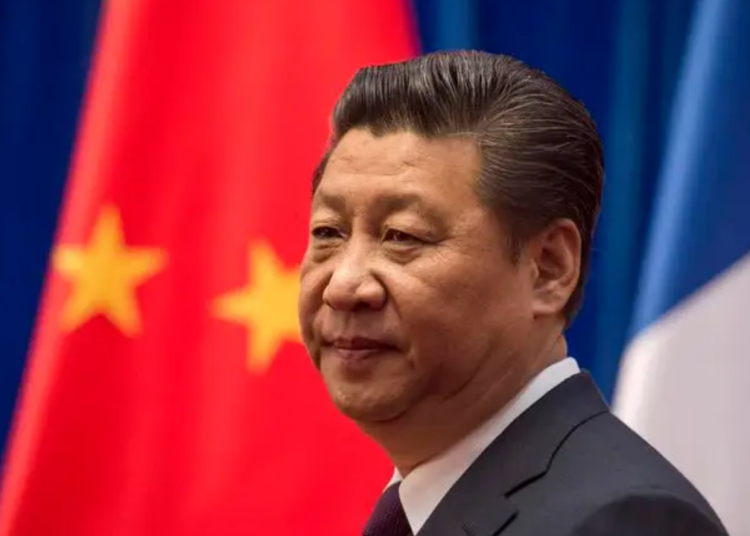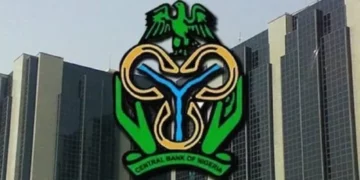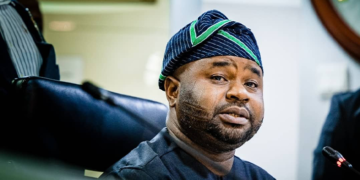Chinese President Xi Jinping has announced that 350 billion Yuan will be earmarked to boost the economies of developing countries even as he unveiled eight new steps to strengthen the Belt and Road Initiative (BRI) for a stronger cooperation among nations to achieve shared prosperity in the future that will benefit Nigeria and about 150 other countries.
The Chinese leader made this known while delivering his keynote address at the 3rd edition of the Belt and Road Forum For International Cooperation with the theme “High Quality Belt and Road Cooperation: Together for Common Development and Prosperity”, which opened in Beijing on Wednesday in the presence of presidents, Prime Ministers and leaders of about 150 countries and about 4,000 journalists, which also gathered to mark the 10th anniversary of the BRI.
In one of the steps unveiled, President Xi said China will promote both signature projects and “small yet smart” livelihood programs. “The China Development Bank and the Export-Import Bank of China will each set up a RMB 350 billion financing window. An additional RMB 80 billion will be injected into the Silk Road Fund. Together, they will support BRI projects on the basis of market and business operation.”
He said further that “the past decade has been a journey of dedicated cooperation and fruitful outcomes. Belt and Road cooperation was proposed by China, but its benefits and opportunities are for the world to share.
“Let us meet the expectations of the people, assume responsibilities entrusted to us by history, closely follow the trend of the times, and press ahead with energy and enterprise. Let us deepen Belt and Road international cooperation, and bring Belt and Road cooperation to a new stage of higher-quality and higher-level development.”
President Xi, who proposed the BRI in 2013, highlighted the achievements of the initiative in the last decade in various sectors and the positive impacts it has made in infrastructure connectivity of many countries along the maritime and silk road.
He also noted the tremendous contributions of the initiative in trade and investment, commerce and industry, energy development among others.
The BRI was unveiled in 2013 by President Xi as part of China’s opening up process and connecting the world with infrastructure and inclusive development for a shared future. Since 2013, the BRI has attracted over 150 countries as members and about 30 international organisations. China formulated the Strategic Planning on Building of the Silk Road Economic Belt and the 21st Century Maritime Silk Road in 2014 and introduced the Vision and Action on Jointly Building the Silk Road Economic Belt and the 21st Century Maritime Silk Road to the world in 2015.
The BRI is based on the Chinese ideals of “ building a moderately prosperous society and a global community of shared future” and it is centred around issues of advancement in policy, infrastructure, trade, finance and people-to-people connectivity aimed at eliminating poverty with a view to increasing productivity and improving the living standards of the people.
President Xi in his address stressed that the eight major steps will enable China to make more efforts in the joint pursuit of high-quality Belt and Road cooperation, adding that the Chinese Development Bank and the China Export and Import Bank will continue to make resources available.
Nigeria’s Vice President Kashim Shettima, who represented President Bola Tinubu at the ongoing Belt And Road Initiative Forum in Beijing, China, had on Tuesday said the relationship between Nigeria and China has been fruitful. He said this when he was hosted by his People’s Republic of China counterpart, Vice President Han Zheng, at the Diaoyutai State Guest House, Beijing.
The Vice President in a statement issued by his media aide Stanley Nkwocha, said, “our mutually beneficial relationship will be further enhanced and upgraded to a comprehensive strategic partnership.”
He added: “Nigeria is China’s second-largest trading partner in Africa; it is the largest economy in Africa and the most populous country in the African continent. The Belt and Road Initiative is a big beautiful concept that can be deployed to achieve this.”
Others who graced the occasion included; Russian President Vladimir Putin; Ethiopian Prime Minister, Abiy Ahmed; President of Argentina, Alberto Fernandez; President of Indonesia, Joko Widodo; President of Kazakhstan, Kassym-Jomart Tokayev; the UN Secretary General, Antonio Guterres among many others.
The Eight Steps
The first step, President Xi said is “building a multidimensional Belt and Road connectivity Network,’’ in which he said China will speed up high-quality development of the China- Europe Railway Express, participate in the trans-Caspian international transportation corridor, host the China-Europe Railway Express Cooperation Forum, and make joint efforts to build a new logistics corridor across the Eurasian continent linked by direct railway and road transportation.
“We will vigorously integrate ports, shipping and trading services under the “Silk Road Maritime,” and accelerate the building of the New International Land-Sea Trade Corridor and the Air Silk Road.”
The Second step is supporting an open world economy, where China will establish pilot zones for Silk Road e-commerce cooperation, enter into free trade agreements and investment protection treaties with more countries.
He said “We will remove all restrictions on foreign investment access in the manufacturing sector. In light of international high-standard economic and trade rules, we will further advance high-standard opening up in cross-border service trade and investment, expand market access for
digital and other products, and deepen reform in areas including the state- owned enterprises, digital economy, intellectual property and government procurement. China will hold the Global Digital Trade Expo annually.
“In the next five years (2024-2028), China’s total trade in goods and services is expected to exceed USD 32 trillion and USD 5 trillion respectively,” President Xi said.
The Third Step involves carrying out practical cooperation. In this regard President Xi said China will promote both signature projects and “small yet smart” livelihood programs. “The China Development Bank and the Export-Import Bank of China will each set up a RMB 350 billion financing window. An additional RMB 80 billion will be injected into the Silk Road Fund. Together, they will support BRI projects on the basis of market and business operations.
He said that Cooperation agreements worth USD 97.2 billion have been concluded at the CEO Conference held during this Forum. “China will carry out 1,000 small- scale livelihood assistance projects, and enhance vocational education cooperation through Luban Workshops and other initiatives. We will also step up joint efforts to ensure the safety of BRI projects and personnel,” he added.
The Fourth Step deals with promoting green development whereby China will continue to deepen cooperation in areas such as green infrastructure, green energy and green transportation, and step up support for the BRI International Green Development Coalition.
“China will continue to hold the BRI Green Innovation Conference, and establish dialogue and exchange mechanisms for the solar industry and a network of experts on green and low-carbon development. China will implement the Green Investment Principles for the Belt and Road, and provide 100,000 training opportunities for partner countries by 2030,” he said.
According to President Xi, the Fifth Step is about advancing scientific and technological innovation, whereby China will continue to implement the Belt and Road Science, Technology and Innovation Cooperation Action Plan, hold the first Belt and Road Conference on Science and Technology Exchange, increase the number of joint laboratories built with other parties to 100 in the next five years, and support young scientists from other countries to work on short-term programs in China.
“At this Forum, China will put forward the Global Initiative for Artificial Intelligence (AI) Governance. We stand ready to increase exchanges and dialogue with other countries and jointly promote sound, orderly and secure AI development in the world,” the Chinese leader stated.
The Sixth step is in supporting people-to-people exchanges and in this regard China will host the Liangzhu Forum to enhance dialogue on civilizations with BRI partner countries. “In addition to the Silk Road International League of Theaters, the Silk Road International Arts Festival, the International Alliance of Museums of the Silk Road, the Silk Road International Alliance of Art
Museums, and the Silk Road International Library Alliance that have been set up, China has also launched the International Tourism Alliance of Silk Road Cities. And we will continue with the Chinese government scholarship Silk Road Program,” he added.
The Seventh step is in promoting integrity-based Belt and Road cooperation, President Xi said adding that “together with its cooperation partners, China will release the Achievements and Prospects of Belt and Road Integrity Building and the High-Level Principles on Belt and Road Integrity Building, and establish the Integrity and Compliance Evaluation System for Companies Involved in Belt and Road Cooperation. We will also work with international organisations to carry out research and training on promoting integrity in Belt and Road cooperation.”
Eighth is strengthening institutional building for international Belt and Road cooperation whereby China will work with its BRI partner countries to strengthen the building of multilateral cooperation platforms covering energy, taxation, finance, green development, disaster reduction, anti- corruption, think tank, media, culture and other fields. China will continue to host the BRF and establish a secretariat for the Forum.
We’ve got the edge. Get real-time reports, breaking scoops, and exclusive angles delivered straight to your phone. Don’t settle for stale news. Join LEADERSHIP NEWS on WhatsApp for 24/7 updates →
Join Our WhatsApp Channel










